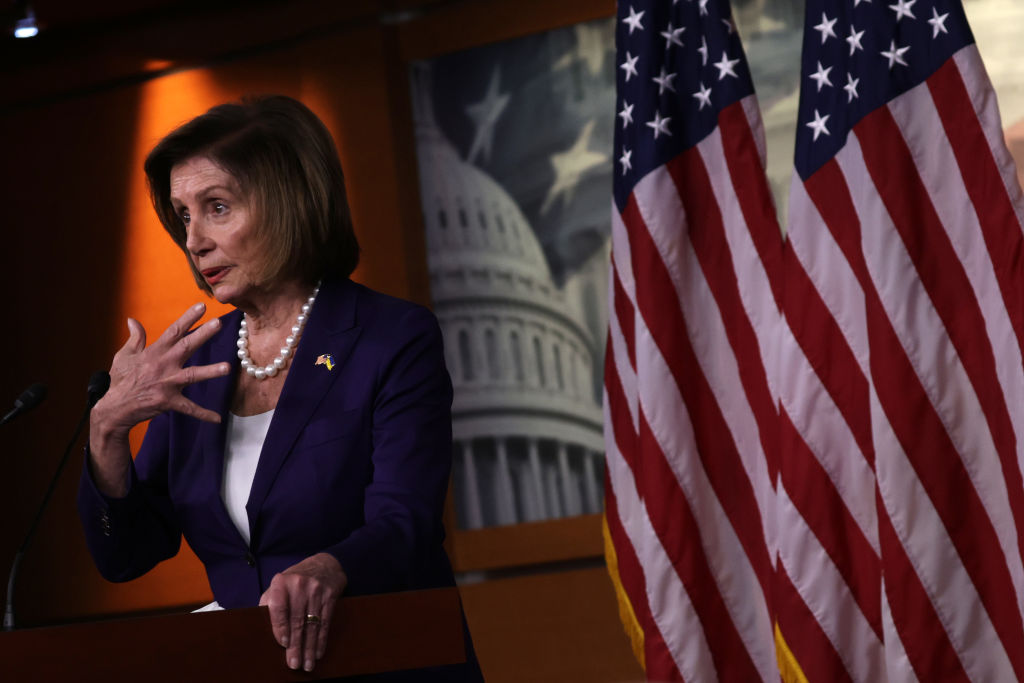Holding members of Congress accountable to the same insider trading laws as anyone else seems like good politics, especially right before an election. The idea of a congressional stock ban – a measure preventing legislators from buying stocks while in office – has bipartisan support. It would increase transparency – or, at the very least, the illusion of transparency, depending on the version that passes – and it’s incredibly popular with voters across the political spectrum. Why, then, did Speaker of the House Nancy Pelosi (D-CA) put forth a new version of the bill that completely ignores the work done by Democrats and Republicans together, only for it to face opposition from both parties? House Majority Leader Steny Hoyer (D-MD), who has not been a supporter of reform in this area, pulled the vote altogether, following the negative response. Could it be that the speaker and majority leader don’t want to play by the same rules as the unwashed masses?
Not Our Stock Ban
 While representatives on both sides of the aisle had worked together to craft reform, Pelosi’s bill was full of “non-starters,” including the structure of qualified blind trusts, the addition of congress members’ dependents in the ban, and a measure expanding the rule to the judiciary. Each of those issues had been worked out in prior discussions earlier in the year, and, according to some Democratic and Republican staffers who spoke to The Intercept, House leadership made no effort to consult them while formulating the new version of the bill. “It wasn’t a real process,” one said. “There were all these things thrown in here that on the surface look good, but make it so expansive, that, you know, it’s not going to make it to the president’s desk.”
While representatives on both sides of the aisle had worked together to craft reform, Pelosi’s bill was full of “non-starters,” including the structure of qualified blind trusts, the addition of congress members’ dependents in the ban, and a measure expanding the rule to the judiciary. Each of those issues had been worked out in prior discussions earlier in the year, and, according to some Democratic and Republican staffers who spoke to The Intercept, House leadership made no effort to consult them while formulating the new version of the bill. “It wasn’t a real process,” one said. “There were all these things thrown in here that on the surface look good, but make it so expansive, that, you know, it’s not going to make it to the president’s desk.”
The staffers proposed that the leadership’s introduction and immediate recall of the legislation only makes sense if viewed as a play to kill real efforts at reform. Perhaps it was meant to fail – or maybe it was simply supposed to be easier on Pelosi’s pocketbook. In any case, it wasn’t the reform the representatives wanted, and several of them – on both sides – made that clear.
Pelosi’s Pocketbook

(Photo by Alex Wong/Getty Images)
The Pelosi family is worth at least $46,123,051, according to an analysis by Business Insider, making Nancy one of the 25 wealthiest members of Congress. The vast majority of that money comes from stocks, options, and other investments made by Paul Pelosi, who has done quite well over the years while his wife sits in Congress. In 2021, Nancy responded to a question about whether members of Congress should be able to buy stock by saying they should be able to participate in the free market.
So, if she prefers no reform at all, why offer up a bill of her own? Damage control, perhaps? Or maybe it’s virtue signaling ahead of the midterms. Whatever the motive, her congressional stock ban both did too much and too little to win a comfortable majority. On the one hand, Pelosi’s proposal would have expanded the ban to judges as well as members of Congress. On the other, it increased the fine for violating the 2012 STOCK Act from $200 to $1,000. Yes, that’s five times as much per offense – but it also amounts to far less than even 1% of the profits in most of Paul’s major trades. That’s a small price to pay for gaining some moral high ground without really sacrificing profits.
Rep. Hoyer pushed for stricter penalties. He wanted more than 48 hours for people to read the bill before voting on it. And he didn’t think it had the votes anyway. Pelosi knew the numbers weren’t there in her own party but said she wished “we would’ve had the Republicans to vote for it because we’re almost there, but there are a few of our members who just … Steny has said he doesn’t want to vote for it, but I can only lose three votes.”
A Midterm Misstep?
 Hoyer says he might well bring the proposal back to vote after the midterms if Democrats hold their majority – which seems like a strange position to take for someone interested in actually keeping said majority. Democrats were already looking at a rough election, and bipartisan reform that increases transparency and trust in the government while making voters on both sides happy is precisely the sort of thing the Democratic Party could use right about now. But instead of a passed bill – whether truly meaningful or merely posturing – House Democrats are stuck with a highlight to their failure to legislate on such a popular issue, despite almost a year of discussion.
Hoyer says he might well bring the proposal back to vote after the midterms if Democrats hold their majority – which seems like a strange position to take for someone interested in actually keeping said majority. Democrats were already looking at a rough election, and bipartisan reform that increases transparency and trust in the government while making voters on both sides happy is precisely the sort of thing the Democratic Party could use right about now. But instead of a passed bill – whether truly meaningful or merely posturing – House Democrats are stuck with a highlight to their failure to legislate on such a popular issue, despite almost a year of discussion.

